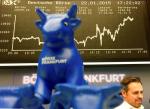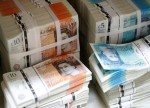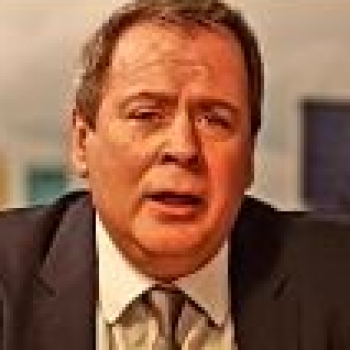
- All Instrument Types
- Indices
- Equities
- ETFs
- Funds
- Commodities
- Currencies
- Crypto
- Bonds
- Certificates
Please try another search

During his first 10 months as Bank of England governor the jury has been out on Mark Carney, do we, or don’t we like him? He’s certainly not commanded the affection of Mervyn King, however things could be changing.Carney scored a PR goal at the May Inflation Report and may have worked his way into the UK public’s heart by bringing back the sporting analogy!
Favoured by Sir Mervyn, who was fond of a cricket analogy, Carney has adopted the national game, football. He likened the recent economic strength to the qualifying rounds of this summer’s World Cup saying that growth so far has been “an achievement, but not the ultimate goal”. He then concluded the analogy by saying the hard work is ahead of us: “The real tournament is just beginning and its prize is strong, sustained and balanced expansion.”
While it is questionable how much input Carney had into creating this analogy (surely he is more of an ice hockey guy??), it was used to great effect by the Bank Governor who had a difficult balancing act: how to juggle acknowledging the strength of the economic recovery with his desire to keep interest rates low?
This analogy worked a treat. Since Carney started speaking forward interest rate curves have pushed back their expectation of the first interest rate rise to April 2015, yesterday this was priced for March 2015.
The economic highlights from the report included:
- GDP estimate for 2014 was unchanged at 3.4%, but 2015 forecasts were upgraded to 2.9% from 2.7%.
- The bank expects unemployment to fall to 5.9% in 2 years' time.
- The bank left its inflation forecast roughly unchanged, although the Bank does expect inflation pressure to remain benign in the medium-term.
On rates:
Carney seems to have convinced the markets that it won’t hike rates any time soon. He said that although the economy is moving towards a rate hike, it is not there yet. The Bank emphasized that any increases in rates will be slow and steady and going forward, bank rates will be lower than they were before the financial crisis.
The Bank also gave clear guidance on its plans for potential future Gilt sales. The Bank said that it will “defer sales of assets” until several rate hikes have passed. The BOE does not want to sell its Gilts, acquired during its QE programme, until rates are at a high enough level that they could be cut to avoid the sales damaging the economy.
Overall, the market seems to have got the message. A rate hike will only take place when the time is right, any hikes will be gradual and rates will remain low compared to historical Levels. The Bank would not be drawn on predicting a policy path for bank rates, unlike the Fed, which suggests that the first hike could be some way off.
The timing of rate hikes: is spare capacity the new unemployment rate?
The bank scrapped its unemployment threshold at the last Inflation Report, which had been used as a guide to predict a potential rate hike. While it has not replaced the economic threshold, it is now using a nebulous concept of “spare capacity”.
This is the amount of “capacity” in the economy that is not currently being used up. The bank has estimated that the spare capacity in the UK is sizable – between 1-1.5%, but, the bank itself admitted that it is very hard to fully grasp how big this gap is.
That is convenient for the BOE. If “spare capacity” is the new economic threshold, yet it can’t easily be measured, this gets the Bank off the hook from raising rates too early. If the Bank thinks that our economy still has spare capacity of 1-1.5% of GDP, even though annual growth was 3.1% in the first quarter, then it could take some time to close this gap, which could delay a potential rate rise.
The market seems to be buying the Bank’s “spare capacity” spiel, and the pound was sent lower, along with UK yields, and as mentioned above, the market has pushed out a rate hike to April 2015 from March 2015.
Housing woes? What housing woes?
Prior to this report we thought that the Bank would spend more time talking about the housing market and the strength of sterling. Instead the Bank does not seem too worried about the pace of house price growth, and the strength of sterling is only a worry as it can weigh on inflation, which supports a delayed rate hike.
Governor Carney will not support a rate hike to deal with a property bubble at this juncture, and the Bank seems to have faith in the FPC to deal with house price inflation before it becomes a wider problem.
Conclusion:
Overall, the market appears to be willing to take Carney at his word. Maybe the Brits could only trust him once he became a football fan? This was a genius analogy, and reinforced that the BOE sees the UK economy at the beginning of the path to normal economic conditions and not mid-way through like some had thought after recent strong economic data. Carney’s argument makes sense, after all the economy has only just returned to its pre-2008 level.
The other point to note is that Carney and co. sound like thy chime in unison. There was no obvious sign of discord on the Committee, even though Carney sounded more dovish than the overall report. This makes the next few meetings interesting, and the minutes will be scoured to see if all MPC members are singing from Carney’s dovish hymn sheet.
For GBP/USD, this report makes a move to 1.70 less achievable in the near term, and we think there could be room for further downside, especially if we see some negative economic surprises in the coming weeks. For now, 1.6654 – the top of the daily Ichimoku cloud – is a key support and a break below this level would be a bearish development as it is the end of the technical up-trend.





